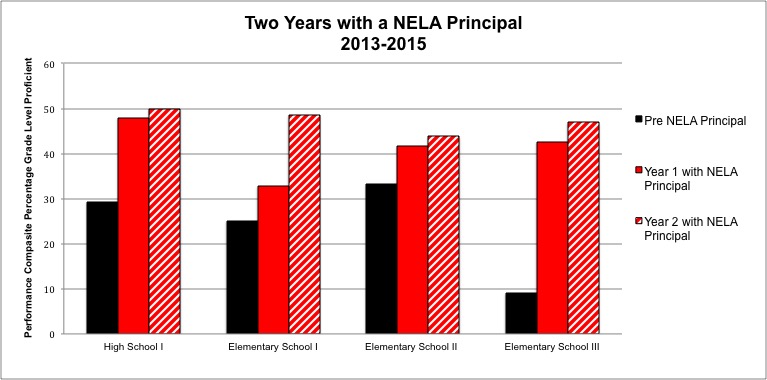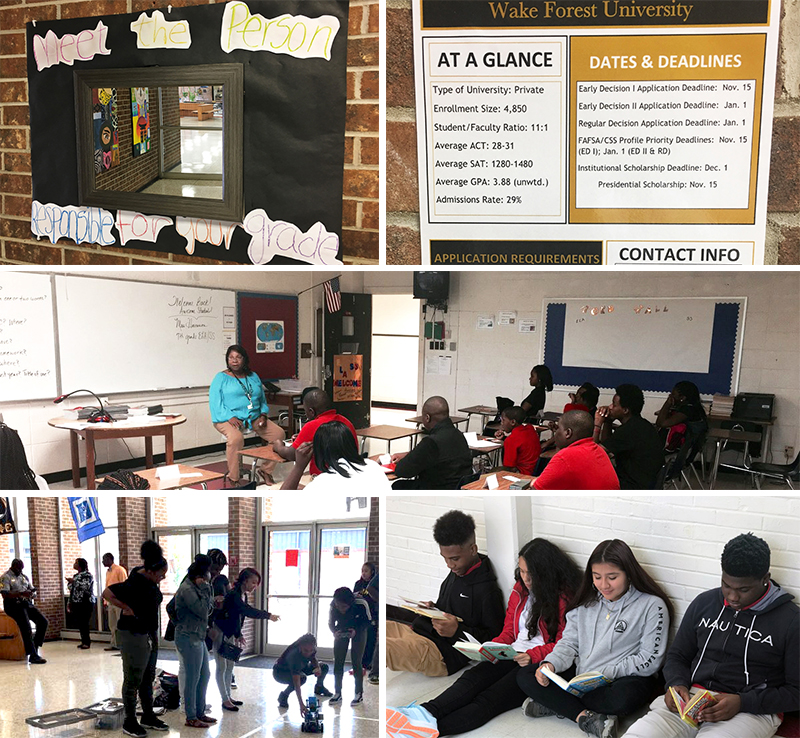

September 13, 2018
The Northeastern Leadership Academy (NELA) is a two-year alternative licensure program for school leaders in rural Eastern North Carolina. Offered by NC State University in partnership with The Wallace Foundation, NELA leverages evidence-based practices in leadership development to improve student achievement in high-need, chronically low-performing schools. The Hunt Institute is currently working on a case study about NELA that will be published later this year.
Members of the Hunt Institute’s Policy Team traveled to Edgecombe County, North Carolina to visit two schools being led by graduates of the Northeastern Leadership Academy. Jennifer O’Meara is in her second year leading Phillips Middle School and Donnell Cannon has served as Principal of North Edgecombe High School since 2016. O’Meara and Cannon, both graduates of NELA’s fourth cohort, welcomed us into their schools to showcase the transformative work underway. Through discussions with students, teachers, and school leaders, we learned about ways in which their shared training shapes their use of data to guide flexibility, supports alignment between their schools’ focus on innovation, and fosters a commitment to school culture and community engagement.
 Graphic, courtesy of the NELA, NCSU Results page
Graphic, courtesy of the NELA, NCSU Results page
“Instead of wasting 1st period, we decided to start school later.”
During a roundtable discussion, Principal Cannon cited the flexibility offered by the Restart Model as enabling him to put research into practice. Evidence shows that high school students are better prepared to learn later in the morning, so North Edgecombe students have a later start to their school day. The flexibility allocation of staff positions has allowed for use of the Opportunity Culture Model, in which excellent teachers take on additional leadership roles. This results in opportunities for sharing successful teaching practices, as well as professional growth for aspiring school leaders.
“Why do you work on education policy? Why is it important?”
Students at the North-Phillips Micro School of Innovation were quick to get to the point when asked if they had questions for our Policy Team. Comprised of 8th-grade students from Phillips and 9th-grade students from North Edgecombe, the Micro School is serving as a pilot program for the use of project-based learning. Their questions spurred an impromptu conversation about their views on the value of education. Students expressed a need for strong relationships with teachers and role models in order to see a future in which they can be successful in high school and beyond.
“I feel safe at school. I feel like I’m ready to learn.”
A senior at North Edgecombe thoughtfully reflected on the change in her school experience since Mr. Cannon arrived on campus during her sophomore year. Throughout the day we found students actively applying classroom knowledge to the world around them and taking ownership of their learning. Students were engaged in conversations with a county sheriff, participating on school improvement committees, and using computer software to design a home as part of a senior project. A 7th grader at Phillips Middle School paused in the hallway to describe the empowerment students feel when teachers are passionate about their work and are visibly invested in the lives of their students. When asked, “what do we say about our students?” he confidently responded, “we are the architects of our own lives,” reminding us that strong, visionary leadership develops strong, visionary leaders.
 Some images, courtesy of North Edgecombe High School, Phillips Middle School and Matthew Curtis
Some images, courtesy of North Edgecombe High School, Phillips Middle School and Matthew Curtis
For more information about NELA’s partnership with the Wallace Principal Preparation Redesign,
please visit here

Author
Allison Goff
Associate Policy Analyst, The Hunt Institute